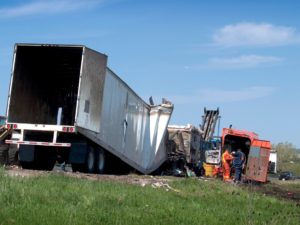Driver error is the most common cause of car and truck accidents, but it is certainly not the only cause. In some cases, improper vehicle maintenance can cause mechanical malfunctions that result in highway accidents.
According to the Federal Motor Carrier Safety Administration (FMCSA), commercial truck carriers must carefully inspect and maintain all vehicles under their control. If failure to do so results in a crash or causes harm, the carrier may be liable.
If you were injured in a serious truck accident, contact the nation’s leading truck accident lawyers at Munley Law Personal Injury Attorneys. We will review your case for free and advise you on how to proceed. 
What Are the Common Maintenance Issues That Cause Truck Accidents?
Large trucks are complex systems with hundreds of parts that must be kept in good working order. Heavy commercial trucks also endure an enormous amount of wear and tear. Interstate truckers can travel more than 100,000 miles yearly; regular inspection and maintenance is essential to keep these large vehicles operational.
Common issues that can result from neglected maintenance include:
- Worn tires – Worn or bald tires are more prone to blowouts, especially at high speeds or under heavy loads
- Worn brakes and brake pads – Over time, brake pads can wear out, reducing their effectiveness and increasing stopping distances.
- Faulty lights, signals, and warning systems – When lights and exterior illumination are not functioning properly, trucks lack the necessary visibility to operate safely.
- Worn cargo straps and couplings – Improper cargo securement and tie-down equipment can cause cargo to shift unsafely or even come loose and fall off of the truck bed.
- Steering problems – Malfunctions in the steering system, such as worn tie rods or steering linkage, can lead to loss of control
What Are the Consequences of Poor Truck Maintenance?
Improper truck maintenance can lead to a series of grave consequences for the truck driver and other motorists on the road. Besides the risk of breakdowns and costly delays, neglected maintenance can pose a serious safety risk.
Inadequately maintained brakes can fail, especially under heavy use conditions like descending steep grades, leading to catastrophic accidents. Poor tire maintenance, including incorrect tire pressure and worn tread, can cause blowouts, resulting in loss of control. Failure in the steering mechanism can also lead to the driver losing control of the rig.
All of these scenarios can prove deadly for truck drivers and the driving public. A serious truck accident caused by mechanical failure and poor maintenance can cause injuries ranging from broken bones and scarring to traumatic brain injury and even death.
Failing to maintain their fleet of trucks properly can also result in serious financial and legal consequences for trucking companies. If an accident is caused by poor maintenance, the trucking company (or independent trucker) could be held liable for damages, which can be substantial in cases of serious injury or death.
Who Can Be Held At Fault For Poor Truck Maintenance?
Trucking companies are responsible for ensuring their vehicles are properly maintained, but the driver also plays an important role.
The Federal Motor Carrier Safety Administration (FMCSA) has established regulations and rules to ensure the safe operation of commercial trucks, including requirements related to truck maintenance.
Truck Driver Liability
Drivers must conduct pre-trip inspections of their vehicles to identify any defects or safety concerns before starting their journey. They must also complete a written report documenting the results of their pre-trip inspection. Any defects or deficiencies identified must be noted on the report, and corrective action must be taken as necessary. If an investigation finds that the truck driver involved in your accident failed to adhere to these rules, the driver may be held partially at fault.
Trucking Company Liability
Motor carriers, including trucking companies, are required to maintain records documenting inspection, repair, and maintenance activities for each vehicle in their fleet. These records must be retained for a specified period and made available for inspection by authorized personnel upon request. Commercial motor vehicles must undergo systematic inspection, repair, and maintenance to ensure safe operation. This includes pre-trip inspections, periodic inspections, and inspections following repairs or adjustments.
Motor carriers are responsible for ensuring that their drivers and maintenance personnel receive adequate training on proper vehicle maintenance procedures and safety practices. Maintenance procedures should be established and documented to ensure consistency and compliance with regulatory requirements.
In addition to the trucking company and drivers, other responsible parties might include manufacturers, suppliers, and maintenance personnel.
An experienced truck accident lawyer who is familiar with federal and state motor carrier regulations will investigate to determine the cause of your accident and identify all responsible parties to ensure you get the justice you deserve.
How Can I Prove Poor Truck Maintenance Caused the Truck Crash?
In the initial aftermath of a major truck crash, it can be difficult to determine definitively if the accident was caused by driver error or mechanical malfunction. In some cases, more than one party is to blame. The truck driver, trucking company, mechanics, and even truck part manufacturers may be liable for your injuries.
Proving that poor truck maintenance caused a crash requires gathering evidence and establishing a causal connection between the maintenance issue and the accident. This is where a highly skilled truck accident attorney can help. The team of attorneys at Munley Law will examine the following types of evidence to determine whether improper maintenance played a part in the accident that caused your injuries:
Vehicle Inspection Records: Reviewing maintenance and inspection records can provide insight into the truck’s maintenance history, including any past issues or neglect.
Driver Logs and Reports: Analyzing driver logs, pre-trip inspection reports, and driver statements can help determine whether maintenance issues were identified or reported before the accident.
Expert Analysis: Consulting with mechanical or forensic experts can help assess the truck’s condition and its components post-accident to identify any maintenance-related issues.
Witness Testimony: Gathering statements from witnesses who observed the truck before the accident or may have seen maintenance issues firsthand can provide additional support for your case.
Photographic and Video Evidence: Collecting photographs or video footage of the truck before the accident, if available, can help establish the vehicle’s condition and any visible maintenance deficiencies.
Documentation of Compliance or Non-Compliance: Providing evidence of compliance or non-compliance with FMCSA regulations regarding maintenance requirements can strengthen your argument regarding the truck’s maintenance practices.
Was The Truck Improperly Maintained? We Can Help
 Proving negligence in a truck accident case requires an experienced truck accident attorney. While many personal injury law firms handle car accident cases, only a few have the necessary experience and industry knowledge to win a serious truck accident case.
Proving negligence in a truck accident case requires an experienced truck accident attorney. While many personal injury law firms handle car accident cases, only a few have the necessary experience and industry knowledge to win a serious truck accident case.
At Munley Law Personal Injury Attorneys, we have devoted a significant portion of our practice specifically to commercial trucking litigation. Our attorneys lead national associations of trucking lawyers and travel around the U.S. to educate other lawyers about issues in trucking law. We have won millions of dollars in cases against trucking companies that failed to follow federal safety regulations.
Contact a truck accident lawyer at Munley Law Personal Injury Attorneys for a free consultation.
We know how devastating a truck crash can be, whether you’re an injured trucker or a motorist who was hit by a big rig. We offer free, no-obligation consultations, and there is no fee for our services unless we win your case. Contact us today to get answers to your questions and get started on the road to recovery.
Reviewed by Bernadine Munley, Esq., Personal Injury Attorney at Munley Law, on June 25, 2025.









